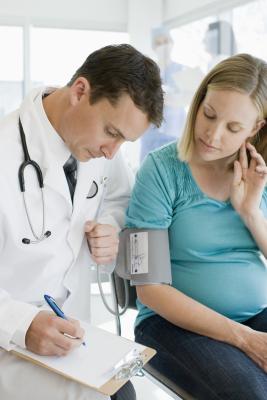High blood pressure problems during pregnancy are fairly common, affecting between 6 and 8 percent of expecting mothers in the U.S., according to the National Heart, Blood and Lung Institute. Many pregnant women with high blood pressure go on to deliver healthy babies. But in some cases, high blood pressure can endanger the life of both you and your developing child.
About Blood Pressure
Blood pressure refers to the pressure your blood exerts on your artery walls as it courses through your body. When your doctor takes your blood pressure, he gets two numerical readings. The first number is your systolic pressure and gauges the amount of pressure exerted on your arteries as your heart contracts. The second number is your diastolic pressure and assesses the pressure in your arteries when your heart is relaxed. Blood pressure readings are made up of these two numbers, separated by a slash mark. Readings of less than 120/80 in pregnant women are considered within normal limits, says the American College of Obstetricians and Gynecologists, or ACOG. A reading of 140/90 or more suggests that your blood pressure is high.
Gestational Hypertension
If you already had high blood pressure before you got pregnant, this is called chronic hypertension. However, if you didn’t have high blood pressure before pregnancy, but experience it during the second half of your pregnancy, this is known as gestational hypertension. Gestational hypertension resolves after you give birth, says the ACOG.
Preeclampsia
High blood pressure during pregnancy can lead to a more serious condition called preeclampsia, that occurs after the 20th week of pregnancy, according to MayoClinic.com. The most telling difference between hypertension and preeclampsia is that expecting mothers have both high blood pressure and excessive levels of protein in their urine. Preeclampsia is a condition that’s taken seriously; when it reaches a critical point, it causes damage to the vital organs and in some cases, even seizures, cautions the ACOG. If you have preeclampsia, you may require hospitalization.
Complications
High blood pressure during pregnancy is associated with numerous complications that may affect you and your baby. Women with preeclampsia are more likely to eventually suffer from cardiovascular disease, even if they have no problems with high blood pressure after childbirth. High blood pressure decreases the amount of blood that gets to the placenta, decreasing your baby’s supply of oxygen and nutrients. Your baby, who doesn’t grow as quickly as he should, may have a low birth weight. According to the ACOG, if high blood pressure is particularly severe, your doctor may induce labor early or deliver your baby via Cesarean section.
Prevention and Treatment
Although the cause of preeclampsia is still unclear, the ACOG indicates that some women are more at risk than others, such as first-time mothers, women age 35 and older and those with certain health problems, such as diabetes, kidney disease and obesity. To reduce your chances of high blood pressure, don’t skip prenatal appointments. Eat a healthy diet low in sodium, advises MayoClinic.com. Don’t gain too much weight during your pregnancy and don’t go off hypertension-treating drugs if you have chronic high blood pressure — talk to your doctor about the safest medication choice. If you suspect you may have gestational hypertension and experience the classic symptoms — headache, changes in vision, sudden weight gain or swelling in the hands and face — contact your physician immediately.





